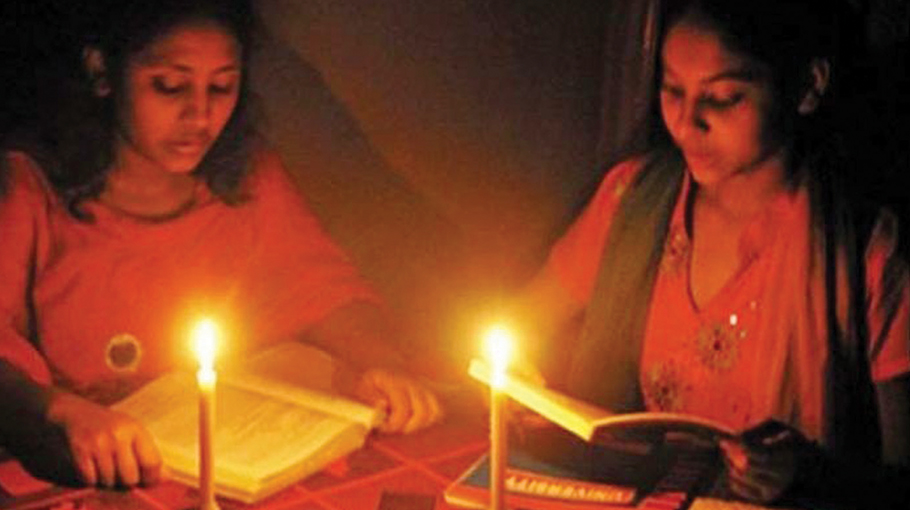Power outages hit country

Many power plants sit idle for fuel crisis
Production suspended at Barapukuria power plant
Rural areas experiencing 8-12hrs load-shedding
Businessmen in Sylhet threaten to go for movement
The whole country from remote villages to the capital city of Dhaka is experiencing severe power outages, crippling the lives of millions of people.
Shortfall in production at different power plants amid the rise in temperature is the main reason for the erratic electricity supply across the country.
Besides, suspension of production at Barapukuria Thermal Power Plant has intensified the power crisis.
People of rural areas and even in district and upazila towns across the country are experiencing load-shedding for 10 to 12 hours every day.
The interim government led by Dr Muhammad Yunus, which took office on August 8 after the fall of the Awami League regime, is facing challenges.
People of the country are getting angry at frequent load-shedding. The businessmen in Sylhet have already threatened to go for movement in protest against frequent power outages. Power crisis has intensified across the country for the last four days due to rising mercury. “We are facing load-shedding for 10 to 12 hours every day. It is unbearable amid the sweltering heat,” said Lukman Uddin, an UP chairman in Sylhet.
People of Dhaka city are also suffering a lot for frequent load-shedding. “We are facing load-shedding in day time and also at night. There was no electricity for about an hour last night,” said Raihan Uddin, a resident of South Banasree area in the capital.
Load-shedding continues to increase across the country as the power generation from gas-based power plants is still below the expected level. The current demand for electricity is about 16,000 megawatts while the country’s electricity production capacity is now around 27,791 megawatts. However, the country is experiencing around 2,000 megawatts (MW) of load-shedding every day, according to data from the Bangladesh Power Development Board (PDB).
The previous Awami League government is mainly responsible for the current power outages as then government constructed power plants one after another without ensuring a steady fuel supply. As a result, the power plants in the country are kept idle for long period every year.
Khandkar Mokammel Hossain, a member of the PDB; said that there is insufficient fuel to operate the power plants, resulting in increased load-shedding. Shortage of gas supply and overdue bills have led to the fall in electricity production. The government has taken measures to address the problem, and the situation is expected to improve soon, he added.
Power plants with at least 10,000MW unutilised capacity are sitting idle due to fuel shortage or maintenance, while 6,300MW due to fuel shortage and 3,600MW for maintenance. Compared to last month, the unutilised capacity has increased due to fuel shortage this month.
Meanwhile, gas-fired plants of 4,093MW capacity are sitting idle due to a shortage of fuel. The country has a total of 11,428MW installed capacity from gas sources. At least 25 gas-fired power plants have been shut down since May 27 when cyclone Remal hit the coastal areas, according to PDB.
PDB’s largest single power supplier, the 1,496MW Adani Godda power plant located in India’s Jharkhand, is producing around 1,000MW of electricity. Recently, they have sent letters to chief adviser of the interim government and others to clear their eight months’ outstanding bills amounting to $800 million.
Muhammad Fouzul Kabir Khan, advisor to the ministry of power, energy and mineral resources, said that power plants were built without securing fuel supply. They will review all power plant contracts and provide recommendations for any irregularities found. However, the power plants which are idle most of the time will be shut down, he added.
While many power plants remain idle, the suspension of power generation at the Barapukuria Thermal Power Plant intensified problems. Power generation at the coal-based thermal power plant was fully suspended on Monday after its third unit was forced to shut down due to a technical glitch.
All three of its power-generating units are now non-operational, said Md Abu Bakkar Siddique, chief engineer of the power plant.
The Barapukuria plant, managed by Bangladesh Power Development Board (BPDB), has the capacity to produce 575-megawatt of electricity. It generates 200 MW of electricity daily, which is supplied to the national grid.
Abu Bakkar Siddique said that each of the three units of the power plant requires two electro-hydraulic oil pumps to function. Since 2022, one of the pumps in the third unit remained out of service, and the plant was running depending on a single pump, leading to operational risk. Despite repeated notifications to the contractor, the problems remained unresolved. After a 36-day shutdown, the third unit resumed operation on September 6, but its last oil pump broke down on Monday evening, he added.
He, however, said that the plant will be able to resume operations once the necessary parts arrive from China.
While people are facing suffering for load-shedding, the frequent power outages also hit hospitals, education institutes, industries and business across the country. This crisis is more acute outside the capital.
In such a situation, businessmen in Sylhet have threatened to go for movement if the power crisis in the district is not resolved in the next 48 hours.
Bangladesh Dokan Malik Shamity, Sylhet, Sylhet Metropolitan and District Businessmen Oikkya Kalyan Parishad issued the threat in a joint statement on Monday. Their ultimate will end today (Wednesday).
According to the statement, the local businessmen are facing severe losses due to excessive load shedding in Sylhet every half an hour. Due to the frequent load shedding shoppers avoid going to markets leading to reduced sales every day.




